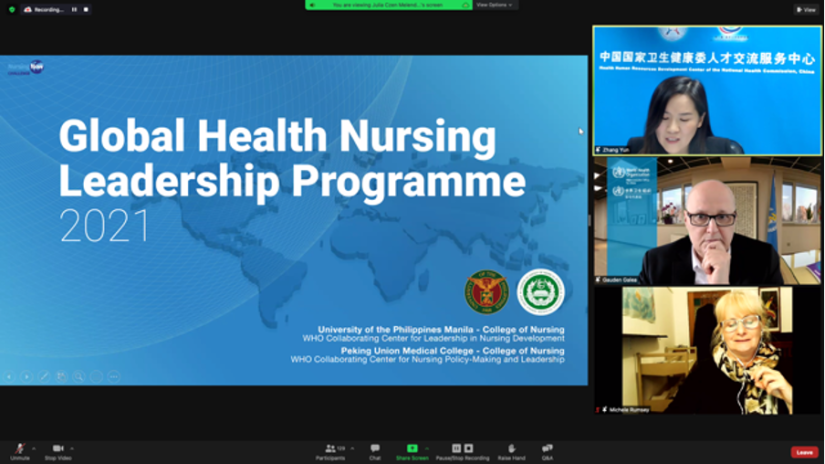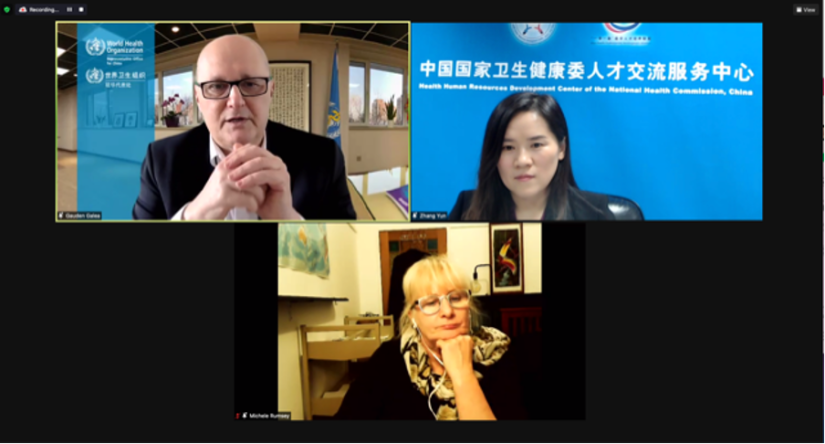The University of Philippines Manila - College of Nursing in collaboration with the Peking Union Medical College - School of Nursing created the Global Health Nursing Leadership Programme 2021. The program aims to develop ‘fit for the future’ nursing leaders through a 6-week program designed for professional nurses assuming leadership roles in the fight against COVID-19 across the Western Pacific Region. The program is comprised of a mix of synchronous and asynchronous activities to engage participants in critical discussions and share valuable experiences in pandemic response. The synchronous activities include three webinars, while the asynchronous activities include three two-week modules on the University of Philippines College of Nursing Learning Management System (LMS), discussion sessions and the completion of assignments through the LMS. At the end of the program, participants are expected to analyse the current global health landscape and the contribution of nursing, share leadership experience during the global pandemic, examine leadership styles and management practices and demonstrate policy and advocacy roles of nurse leaders in global health.

On the 30th of November, the third Global Health Nursing Leadership Programme (GHNSLP) webinar even took place. The webinar series looks at ways to step up and drive health outcomes through a systems-based approach built on the foundations of a strong primary health care system, and the challenges and changing health landscape as a result of the COVID-19 pandemic. The aim to achieve Universal Health Coverage (UHC) and the Sustainable Development Goals (SDG) underpin the series and program. The webinar series started with an introduction to global health nursing, followed by leadership and management. The third event in the webinar series looks at policy and advocacy with speakers Dr. Gauden Galae and Dir. Michele Rumsey.

Michele Rumsey is the Director at the University of Technology Sydney, World Health Organisation Collaboration Centre for Nursing, Midwifery, and Health Development. Michelle was the first presenter on policy and advocacy and presented on stakeholders’ analysis and engagement strategies and advocacy and strategic communication. Michelle’s presentation looks at the early stages of developing policies and partnerships. The importance of understanding the context of different countries and regions to achieve a truly integrated approach in strengthening the healthcare workforce was emphasied. This includes the understanding of the current context of governance, education, associations, and regulation. Understanding the broader political, social, cultural, environmental, and historical context specific to each country/region is further identified as important factors to consider. After understanding the context, the next area to look at when developing policies and partnerships is identifying a high-level strategy as a hook to work towards. The important strategy the WHO released in 2021 – the Global Strategic Directions for Nursing and Midwifery 2021-2025 was highlighted in this section. It is the first strategy for nursing and midwifery that has been mandated by the WHO. Countries around the world are required to respond and answer to the four priority areas in the strategy which include leadership, education, jobs and service delivery. The next component Michelle discusses is ‘Audience Mapping’ which is needed to understand the stakeholders and audience involved and how they are influenced. Following audience mapping is partnership. Partnership includes effective communication and mutual trust to ensure everyone involved is on the same page, working towards the same goals harmoniously. Goals will not be achieved without safety, respect and collaboration. The final component Michelle discusses is the importance of perseverance and self-care among healthcare workers including capacity building. This section was further used as an opportunity to expose the Basic Psychosocial Skills Training for COVID-19 Responders, a free course in which participants of the program are encouraged to take.
It is essential for nurses to have an influential role in health policy formulation and decision-making and contribute to the effectiveness of health and social care systems.
- Dr Gauden Galea
Following Michele’s presentation was Dr Gauden Galera. Dr Gauden is the representative for the WHO in China. His part of the presentation focuses on health policy analysis and development, global health policy making and policy arena for nurses. Strengthening nurse leadership for both current and future leaders was emphasized as it is deeply linked to health policy. Dr Gauden further discusses the converging concepts of international health, global health, and planetary health as well as the threats to human health which is deeply linked to the mentioned concepts. Investing in health was also discussed, emphasizing the importance of using money wisely to ensure the best value. This prompted the development of burden of disease studies and the investment in interventions that are most likely to reduce the burden of disease. The macro-economics and impact of investing in health was discussed and further and looked at commercialisation and commoditisation of healthcare. Dr Guaden explains the importance of nurses to root themselves in the context of commercial determinants as they are a dominant commodity in healthcare.

